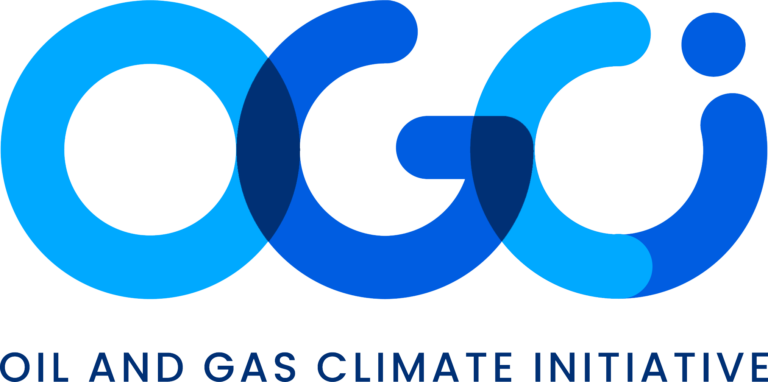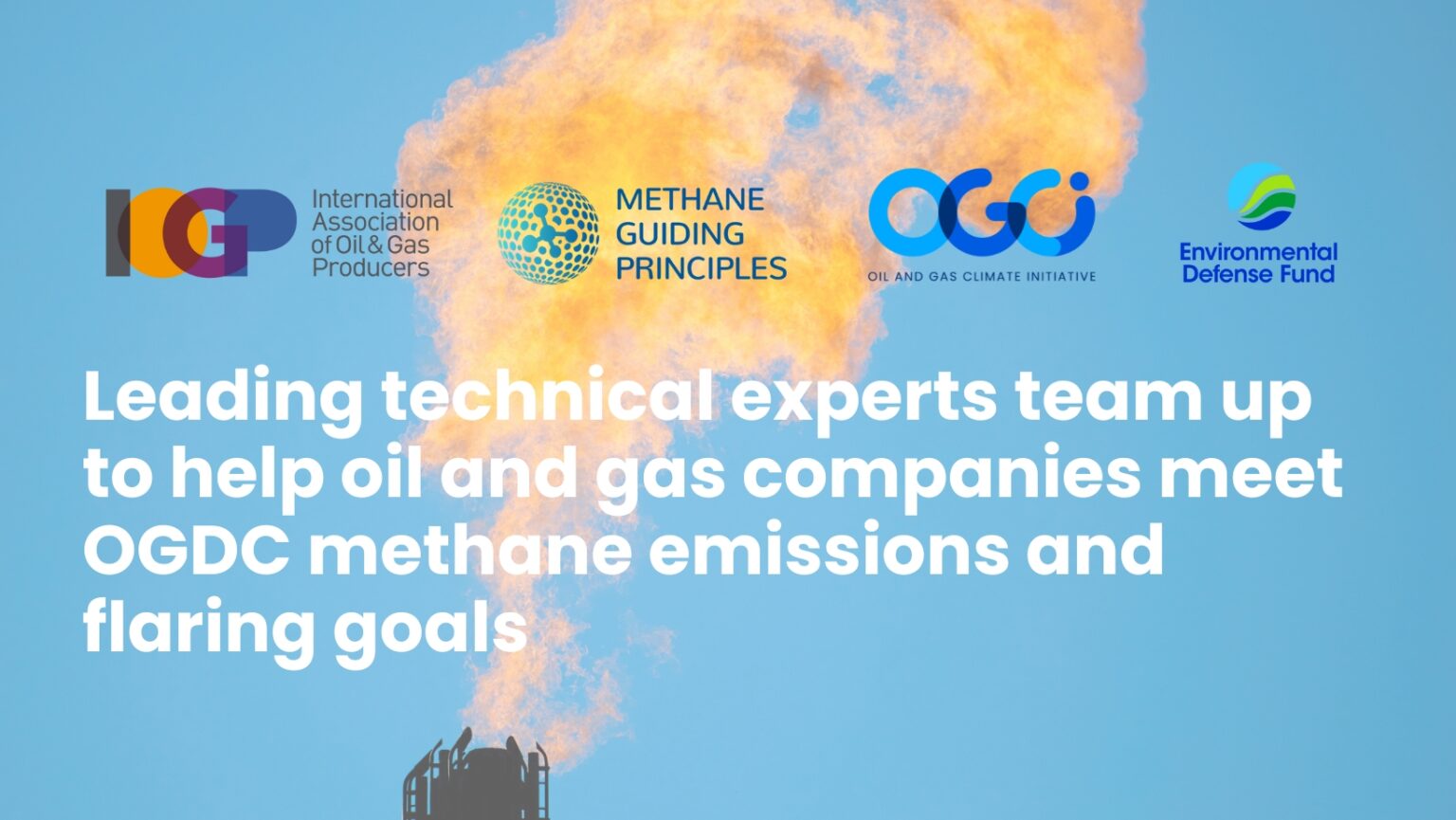- Group of leading experts includes IOGP, MGP, OGCI and EDF
- Group will develop a framework that helps OGDC signatories and other companies meet their methane and flaring ambitions
- Achieving near-zero methane emissions and eliminating routine flaring by 2030 is an essential objective of the Oil & Gas Decarbonization Charter
The International Association of Oil and Gas Producers (IOGP), Methane Guiding Principles (MGP), Oil and Gas Climate Initiative (OGCI) and Environmental Defense Fund (EDF) today announced their intention to build a framework to share expertise to help companies reduce methane emissions and flaring in line with the Oil & Gas Decarbonization Charter (OGDC) ambitions.
The OGDC was launched at COP28 in Dubai to help rally a broad set of national, privately held and independent oil and gas companies to implement and accelerate climate actions to virtually eliminate methane emissions and routine flaring by 2030 and achieve net zero emissions from oil and gas operations by 2050.
Reducing methane emissions can help deliver significant short-term climate benefits alongside a reduction of the industry’s overall emissions.
IOGP, MGP, OGCI and EDF said in a joint statement of intent that they will work closely with other organizations and associations and technical service providers, such as Ipieca, the UN Environment Programme and the World Bank’s Global Gas Flaring and Methane Reduction Partnership trust fund, to help deliver on the OGDC’s ambitions.
The group will build on existing frameworks and use existing expertise and partnerships to quickly stand up a technical support framework available to any company seeking to reduce its methane emissions and flaring.
Immediate areas of focus for the group will include outreach and engagement, promoting the adoption of guidance, standards and reporting frameworks and enhanced access to technical support.
IOGP CEO Graham Henley said:
“IOGP has deep capability through its well-established communities of practice, expertise and technical subject matter experts to help address methane emissions and flaring in line with the Oil & Gas Decarbonization Charter (OGDC) ambitions. Over the past three years we have been developing materials to support our members monitor, measure and reduce emissions, and supporting them to drive down methane and other emissions. It’s an exciting opportunity to put that expertise to use, and to further build on our efforts to help the industry decarbonise.”
MGP’s Chair Cederic Cremers said:
“It is great to see that through the OGDC methane and flaring commitments, additional key industry players are committing actively to the methane journey, helping to accelerate methane emission reductions globally. Through the Advancing Global Methane Reductions (AGMR) initiative, MGP will continue to engage with governments and industry to reduce methane emissions at country level. MGP is looking forward to working with OGCI, IOGP, EDF, IPIECA and others on developing a framework that helps OGDC signatories and other companies meet their methane and flaring commitments.”
OGCI Executive Committee Chair Bjørn Otto Sverdrup said:
“OGCI and its member companies have collectively made good progress reducing methane emissions and flaring in recent years and we have a lot of experience we would like to share with other oil and gas companies in support of the OGDC ambitions. Indeed, we are already sharing some of that experience through our flagship Satellite Monitoring Program which collects high-resolution data on large methane plumes and uses confidential engagement with local operators to help them identify and address the sources of the emissions.”
Environmental Defense Fund Vice President of Energy Transition Matt Watson said:
“The OGDC is bringing a whole new set of companies into the global methane reduction effort. Some are ready to go. Others will need more support to deliver major emission reductions on the rapid timelines required to meet climate goals. EDF is pleased to lend its expertise – particularly in the areas of methane monitoring and emissions reporting – to help companies acquire the knowledge and the tools to meet their commitments in ways that are reliable, durable and transparent.”
Notes to editors
- Outreach and engagement will build on existing networks and initiatives such as those in the MGP-led Advancing Global Methane Reductions (AGMR) country-level engagement and OGCI’s flagship Satellite Monitoring Campaign.
- Promoting adoption of guidance and standards includes improving access to existing publicly available technical guidance, best practices, standards, and reporting frameworks, and promote industry adoption of existing guidelines such as OGCI’s target setting methodology, MGP Methane Policy Toolkits, IOGP Energy Transition Practices and the UN’s OGMP2.0 framework.
- IOGP will provide technical support on the development of sustainable methane and flaring reduction programs and projects through workshops and technical deep dives. Access to technical support may also come from other parties where available.
- This includes solutions that can minimize methane from leaks, venting and flaring across the oil and gas value chain. These will be made available to OGDC signatories and other companies to scale up industry efforts to deploy methane and flaring reduction programs.
IOGP
The International Association of Oil & Gas Producers (IOGP) is the global voice of our industry, pioneering excellence in safe, efficient and sustainable energy supply – an enabling partner for a low-carbon future. Our Members operate around the globe, producing over 40% of the world’s oil and gas. Together, we identify and share knowledge and good practices to improve the industry in areas such as health, safety, the environment and efficiency.
Methane Guiding Principles
- Established in 2017, the MGP is a senior-executive-led methane coalition counting 50 members today.
- The MGP convenes industry and civil society and aims to reduce methane emissions from the natural gas supply chain.
- MGP focuses on five key areas of action to drive down methane emissions: 1) continually reduce methane emissions, 2) advance strong performance across the gas supply chain, 3) improve accuracy of methane emissions data, 4) advocate strong policy and regulations on methane emissions, and 5) increase transparency.
- In line with its five guiding principles, MGP members develop and share practical tools and guidance to help others to learn from their experience and put those lessons into practice.
OGCI
- OGCI is a CEO-led organization bringing together 12 of the largest companies worldwide to lead the oil and gas industry’s response to climate change. It aims to accelerate action towards a net zero emissions future consistent with the Paris Agreement.
- Together, OGCI member companies represent almost 30% of global oil and gas production. OGCI members are Aramco, bp, Chevron, CNPC, Eni, Equinor, ExxonMobil, Occidental, Petrobras, Repsol, Shell and TotalEnergies.
- Since 2017, OGCI’s member companies have collectively halved their absolute upstream methane emissions and cut flaring by 45%. They have also backed the development and implementation of innovative technologies that find and stop methane leaks.
- Learn more about our decarbonization efforts in our annual Progress Report.
EDF
- One of the world’s leading international nonprofit organizations, Environmental Defense Fund (edf.org) creates transformational solutions to the most serious environmental problems. To do so, EDF links science, economics, law, and innovative private-sector partnerships. With more than 3 million members and offices in the United States, China, Mexico, Indonesia and the European Union, EDF’s scientists, economists, attorneys and policy experts are working in 28 countries to turn our solutions into action.




